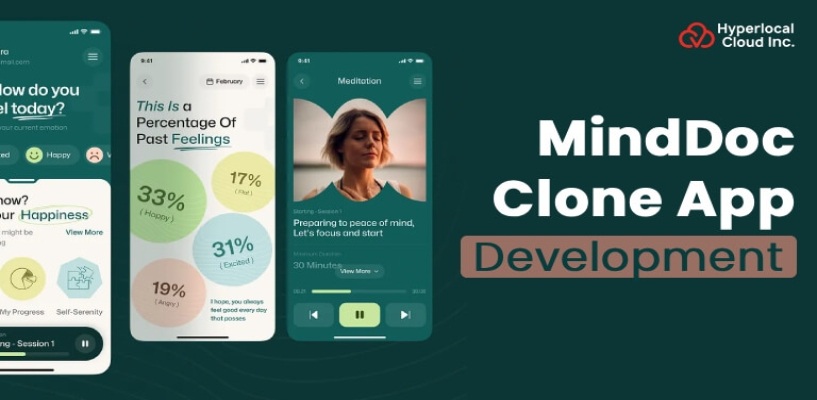MindDoc Clone: Create A Self Management App Like MindDoc

Nowadays, mental health and self-management are increasing rapidly, and mobile apps are playing an essential role in supporting emotional well-being. The app MindDoc is one such utility that stands out. It offers users a way to display their mood and emotional patterns, as well as interact with evidence-based self-management activities and guides.
In the cutting-edge market, mental health apps are now not just first-rate-to-haves; they are turning into mainstream as humans and an increasing number of people are looking for accessible, less expensive, and flexible ways to take care of their emotional well-being. Within this broader market, apps like MindDoc occupy a unique niche. They combine mood monitoring, journaling, healing physical activities, and personalized feedback.
Entrepreneurs are recognizing that users need a self-control app for intellectual fitness, which is available every time, everywhere, and provides an aggregate of monitoring, guidance, and assistance for growth. That’s why startups or entrepreneurs move to develop a MindDoc clone app.
What is a MindDoc App?
The MindDoc app refers to the center software developed by MindDoc Health GmbH, which permits customers to reveal their emotional aspect, self-control, intellectual health symptoms, and participate in guided learning and sporting activities. In simpler terms, the app acts like an associate for your mental fitness. For example, after monitoring your mood over a duration, the fitness app can also highlight routine triggers or suggest relatable concerns.
Request a quote for enterprise self-management app development
The Working Model of MindDoc Clone App
The application works effectively and efficiently to track, identify, and manage users’ mental health. Here you can get to know how a mental health app like MindDoc works.
1. User Onboarding and Profile Set-Up
When the person first installs the app, they go through a welcome display screen or onboarding method. During this degree, the app asks simple questions, such as their demographic information, their general mood or well-being status, and any modern-day concerns they will have.
2. Daily Tracking
Once installed, the app prompts the user to tune their temper and related symptoms regularly. The user might input unstructured-text entries plus choose from predefined tags or moods.
3. Data Analysis and Pattern Recognition
As the person logs over days or perhaps weeks, the backend aggregates the information to become aware of patterns, including improved anxiety or negative sleep, that can lead to a lower temper..
4. Personalized Recommendations
Based on the monitoring records and insights, the app then recommends applicable self-assist modules or publications. These are based on specific challenges, such as insomnia or eating disorders.
5. Reporting and Optional Professional Sharing
For customers who want, the app lets you generate a report that summarises mood tendencies, signs and symptoms, triggers, and maybe readiness for remedy. This file may be downloaded or shared with an intellectual-health professional if desired.
6. Continuous Engagement and Upgrades
To hold users engaged, the app makes use of notifications, reminders, and dependency-forming mechanics. Additionally, a premium model can be had, unlocking advanced functions inclusive of in-depth analytics, extended historical data, additional publications, and offline get right of entry to.
Explore the Business Benefits of Developing a MindDoc Clone
A MindDoc clone app comes with numerous business benefits that are efficient, top-notch, and scalable. Just have a look at the table:
| Key Benefits |
Description |
| Growing Market Demand | By launching a clone app, you tap into this growing trend and capture a vast number of users. |
| Tailored Offerings | A clone app gives you the flexibility to differentiate: you can add features specific to your target region, or specialise in a niche. |
| Data Insights | With user permission, the aggregated data can provide valuable insights, including trends in mental health for your user community. |
| Global Reach | With an app model, once built, you can scale to many users across geographies with relatively lower incremental cost compared to traditional therapy centres. |
| Brand Value | A well-designed clone app can attract partnerships with healthcare providers, insurance companies, employers, and universities. |
| Positive Branding | This increases goodwill, helps brand positioning, and may open doors to regulatory subsidies or grants in some regions. |
| Monetization Options | You have multiple monetization strategies, in-app purchases, corporate licensing (B2B), affiliate partnerships, data analytics, and advertising. |
Know the Exciting Features of the MindDoc Clone App
The most relevant and top-notch features of a MindDoc clone app are precisely discussed below. All you need to do is check the information below.
1. Mood & Symptom Tracking
At the heart of the app lies the ability for users to sing their mood, emotions, symptoms, behaviors, and relevant contexts. This may additionally take the shape of brief test-in questionnaires more than once a day or a daily summary.
2. Journaling or Thoughts/Feeling Log
In addition to providing based questions, the app needs to provide users with a space to journal, allowing them to capture their thoughts, feelings, reflections, and experiences.
3. Visualization of Mood Trends & Data Analytics
Once the person has logged records through the years, the app affords visible comments, which include graphs, charts, and timelines, that show how their temper has changed and how unique triggers correlate with durations of expanded or reduced mood.
4. Personalized Insights and Feedback
Based on the collected records, the app ought to generate personalized comments: “Your mood has a tendency to drop after past due nights”, or “You had more fine days when you did exercise or meditation“.
5. Self-Help Modules / Courses
A substantial characteristic is the capability to engage in structured learning modules. These would possibly cover subjects inclusive of “Basics of emotions”, “Managing tension”, “Improving sleep”, and “Building shallowness”.
6. Reminders, Notifications & Habit-Building
To keep consumer engagement, the app should send gentle reminders: to log temperature, to revisit a module, to study their trend, and to mirror the day.
7. Report Generation & Exporting
After a period of tracking, the app should allow the user to download or export a precise document. The record may additionally consist of a mood chart, primary triggers detected, encouraged modules, and potential pointers, including “you can recall consulting an expert.”
8. Integration with External Data
To deepen insights, the app should combine with tool sensors or different health apps, such as people who sing sleep records, hobby/step matter, heart rate tracking, or wearable devices.
9. Customization and Personal Preferences
The app ought to allow customers to set their own notification instances, pick out which modules they need, choose themes, manage statistics visibility, and regulate settings for privacy and anonymity.
10. Security and Compliance
Since this deals with mental health information, robust privacy and safety are non-negotiable. The app needs to ensure an encrypted garage, achieve personal consent, hold transparent information usage rules, provide a choice to delete records, and observe applicable regulations.
11. Premium/Subscription Features
To monetize, remember enforcing a tiered version: free customers receive primary tracking and restricted modules, while top-class subscribers gain access to the whole library, deeper analytics, offline mode, customized coaching, and more.
12. Support and Escalation Features
For customers who showcase symptoms of excessive hazard, the app needs to provide clean pathways for escalation, which include emergency contacts, disaster strains, “get help” buttons, and likely a connection to professionals.
Explore enterprise-level solutions for your business
The Top-Notch Integration in a Self-Management App Like MindDoc
Here is the top-notch advanced integration in a self-management app like MindDoc that makes it user-friendly and feature-enriched. Just review the information below.
1. Cloud Analytics & Machine Learning Backend
On the backend, you integrate cloud analytics platforms and possibly machine-learning models for pattern detection and prediction. The documentation of MindDoc mentions “ecological momentary assessment” and pattern recognition.
2. Integration with Professional or Therapist Portals
A top-notch app often allows optional linking with healthcare providers: you might develop a therapist portal, where, with user consent, therapists can view the user’s record, graphs, progress, and adjust treatment or provide feedback.
3. Content/Module Integration with Multimedia & Audio
The app needs to integrate with video, audio, and interactive content delivery systems. Courses may include videos, guided audios, interactive quizzes, or check-ins.
4. Payment and Subscription Systems
Integration with payment gateways is essential for monetization. Your clone app must integrate with the platform’s payment systems, as well as web purchase and subscription management systems.
5. Data Export
Users may want to export their data or reports (in PDF or CSV formats) or integrate them with other health systems, such as EHR software or wellness platforms. Providing export functionality increases trust and usability.
6. Multi-Language Integration
If you plan for a global or regional audience, integrate localization frameworks that allow for language, cultural, and region-specific adaptations, as well as local mental health resources.
Understand The Steps to Develop A MindDoc Clone App
Several essential steps are followed to develop a mental health app like MindDoc, of which the most common ones are discussed below.
1. Market research and Requirement Gathering
Begin by getting to know about the niche you are targeting and the audience base you are going to serve. Based on this, define your app’s particular cost proposition and determine which capabilities to implement.
2. UI/UX Design
Design consumer-pleasant interfaces. Since that is a mental health app, the UX needs to be supportive and intuitive, no longer overwhelming. Use shades and layouts that promote ease and comfort. Keep language easy and accessible.
3. Development
Businesses will get two options from which they are required to select the one that suitably meets their business as well as user requirements. By choosing a custom app development method, businesses can develop an app. Otherwise, they can utilize white label solutions for the development of the application. The selection should be made wisely because the overall development cost and deployment time will be dependent on this selection.
4. Testing
Test across devices and OS variations. Because intellectual-health apps have excessive stakes, you can additionally carry out readability and accessibility testing. In a few jurisdictions, regulatory testing may be required if the app is classed as a clinical device.
5. Launch
The right time to launch the application is when the testing phase is completely done. Now businesses can easily launch the application where they can target iOS and Android users in order to get a large number of application downloads.
6. Maintenance
After the successful launch, it is the responsibility of the healthcare software development company to check whether the application performs well or not. For this, businesses can leverage users’ feedback in order to update the application for improvements.
The Tech Stack to Build MindDoc Clone App
A detailed list of technological stacks that an experienced on-demand app development company uses to build a MindDoc clone app is below.
| Category | Tech Stack |
| Frontend | Flutter (Dart) for iOS + Android |
| Backend | Node.js + Express |
| Database | PostgreSQL + MongoDB |
| Analytics | Python for ML, AWS SageMaker |
| Cloud | AWS (EC2, RDS, S3, Lambda) |
| Authentication | Auth0 |
| Payments | Stripe + Apple/Google in-app/ PayPal |
| Notifications | Firebase Cloud Messaging |
| CMS | Strapi |
| Health Data Integration | HealthKit + Google Fit |
| Monitoring | Datadog |
Get personalized advice for building your app
Strategies to Generate Income from MindDoc Clone App
To generate a good income from the fitness tracking app, several revenue streams can be considered by businesses, which are defined below.
1. Subscription Model (Freemium to Premium)
One of the most common models is to offer a free basic model and a top-rate version. Users can subscribe on a monthly, quarterly, or yearly basis.
2. In-App Purchases of Specific Modules
In addition to subscriptions, you could promote particular modules or publications as one-time purchases. This caters to users who do not want a full subscription but want a centered answer.
3. Corporate/Enterprise Licensing (B2B)
Another lucrative method is to provide your app as part of a company wellness application. Employers purchase bulk licenses for their personnel, track anonymized metrics, or offer modules to employee wellbeing applications.
4. Partnerships & Affiliate Marketing
Form partnerships with wellness brands, tele-remedy carriers, and fitness/wearable groups. For instance, you might integrate with a wearable brand and receive repayment for referrals, or you might offer an education/therapy improvement through a companion and earn a referral price.
5. Data Analytics Insights (With User Consent)
With proper anonymization and adherence to prison compliance, aggregated information can be precious to researchers, well-being groups, or institutions. You may also offer anonymised facts and insights to companions/lecturers under strict privacy safeguards.
6. Advertising
Advertising may be a revenue source, but in mental-fitness apps, this has to be handled with intense warning. Ads may additionally lessen belief or be inappropriate for sensitive customers.
7. Tiered Geography / Regional Pricing
If you operate in global markets, use location-specific pricing. Users in lower-earnings areas might pay much less. Offer localised modules and pricing to maximize adoption and sales.
Wrapping Up!
In summary, developing a clone of the MindDoc-style app presents a compelling business opportunity in today’s mental health-aware market. To start your business journey, all you need is to partner with a well-experienced custom software development company that offers you top-notch mobile app solutions. At Hyperlocal Cloud, we developed a MindDoc clone app at $7,000, which is filled with essential features and functionalities. As we serve worldwide, we know how to fulfill your business requirements with ease. So without wasting a second, just reach out to our tech experts.





